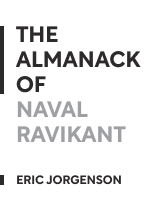

This article is an excerpt from the Shortform book guide to "The Almanack of Naval Ravikant" by Eric Jorgenson. Shortform has the world's best summaries and analyses of books you should be reading.
Like this article? Sign up for a free trial here .
Are you constantly fighting who you are? Do you let others’ opinions get the best of you?
The Almanack of Naval Ravikant offers advice on how to build happiness. Ravikant argues that self-acceptance is a must if you want to be truly happy. He explains that the keys are to accept your own mortality and stop obsessing about what others think of you.
Let’s take a closer look at Ravikant’s advice on how to accept yourself as you are.
Accept Yourself as You Are
If you’re going to be happy, you have to learn how to accept yourself as you are, says Ravikant. Many of us want to change who we are—we’d like to be someone else, or we feel disappointed that we’re not living up to the expectations people have for us. This frame of mind will always stand in the way of being satisfied and finding real happiness.
(Shortform note: Studies find that the practice of self-acceptance closely correlates to feelings of life satisfaction. However, when compared with other habits that promote satisfaction, it was found to be practiced the least. This suggests that most of us have room for improvement in learning to accept ourselves for who we are.)
#1: Accept Your Mortality
According to Ravikant, the best way to accept yourself as you are is to simply accept your mortality: Life is short. Even the greatest cultures of the ancient world passed away, their accomplishments are all but forgotten. When you recognize the brevity and insignificance of all things, you’ll be less inclined to obsess over who you are. With this perspective, you’ll realize that there’s little use in wasting your short life being frustrated or disappointed with yourself—you might as well enjoy the little time you have.
(Shortform note: A growing body of research indicates that an awareness of mortality correlates with greater happiness, as Ravikant suggests. Experts find that as we age past 50 or if we face serious illness, our priorities begin to shift toward the things we find the most meaningful, such as close friends and family, and away from goals such as wealth and recognition.)
#2: Don’t Be Controlled by Others’ Opinions
One other way to accept yourself is to stop obsessing over what others think of you—what they expect you to do or achieve, for instance. Do what you want to do. The sooner you start pursuing your genuine interests, the sooner you’ll experience happiness.
(Shortform note: Some experts are convinced that the advice to “do what you want to do” is problematic. This frame of mind, they argue, leads to discontentment and frustration because not only are passions hard to identify, but they’re also not always good sources of income or long-term satisfaction. In fact, researchers have found that pursuing a passion often leads to psychological stress and misery.)

———End of Preview———
Like what you just read? Read the rest of the world's best book summary and analysis of Eric Jorgenson's "The Almanack of Naval Ravikant" at Shortform .
Here's what you'll find in our full The Almanack of Naval Ravikant summary :
- Millionaire Naval Ravikant's advice on how to build wealth and happiness
- The three types of leverage you'll need to become successful
- The habits to adopt that will lead to happiness






